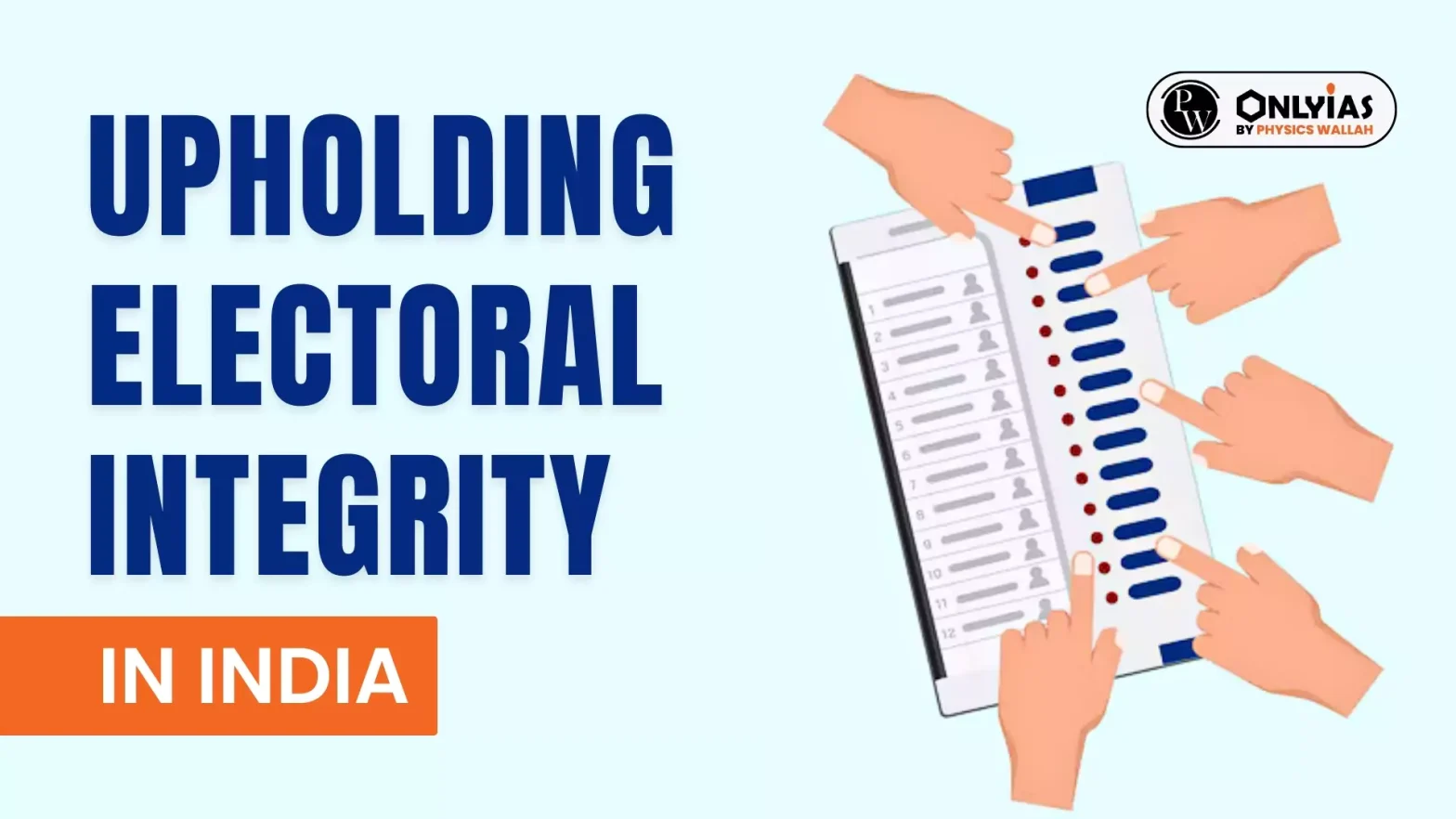Context
The Model Code of Conduct (MCC) has, attracted national attention because of its violation by senior politicians during the election campaign for the 18th Lok Sabha.
Why is Electoral Integrity in India Needed?
- Need to Obey Model Code of Conduct: Political parties are bound to obey the code, which was framed by the Election Commission of India (ECI) based on consensus to ensure peaceful, orderly and fair elections.
- Major Issue: In practice, Indian elections have become a no- holds-barred battle with distortions, falsehoods, personal attacks being common.
Enroll now for UPSC Online Course
Constitutional Mandate of the Election Commission of India (ECI)
- Free and Fair Elections: The Constitution requires the ECI to conduct free and fair elections (part of basic structure of Constitution).
- Plenary Powers: Article 324 gives the ECI plenary powers to ensure free and fair elections and purity of electoral process.
- Supreme Court Affirmation: In Election Commission of India India vs State of Tamil Tamil Nadu (1993), the Supreme Court reaffirmed the ECI’s wide powers and constitutional duty to ensure free and fair elections.
Election Commission of India (ECI) Powers to Punish Violations
- Suspend/Withdraw Party Recognition: The ECI’s 1968 Election Symbols Order allows it to suspend or withdraw recognition of parties for of parties for code violations
- Loss of Reserved Symbol: Suspension/withdrawal of recognition deprives party of reserved symbol, posing enormous electoral difficulties
- Bar Violators from Campaigning: ECI can also bar individual violators from campaigning for 24-48 hours or the entire election period.
- Deterrent Effect: Decisive action by ECI can act as strong deterrent to violations (example of T.N. Seshan’s strictness).
Model Code of Conduct Provisions
- Prohibited Actions:
- Aggravating existing differences or creating communal tension.
- Making unverified allegations against other parties.
- Appealing to caste or communal feelings for votes.
- Corrupt practices or election law offenses.
- Rationale: Violations make it impossible to hold free free and fair elections and maintain electoral purity.
Toxicity of Election Rhetoric
- Do-or-Die Battles: Elections have become a do-or- or-die battle with political opponents treated as enemies.
- Exploiting Divisions: Efforts are made to stir up primal passions and exploit societal divisions, especially religious divides.
- Religious Appeals: The Representation of People Act, 1951 makes religious appeals appeals a corrupt practice that that can invalidate elections.
- Undermining Secularism: However, politicians still place religion at the center of electoral battles, undermining constitutional secularism.
Communal Speeches by Ministers
- Oath Violations: Senior cabinet members have made communally charged speeches promoting hatred against certain groups. This violates the oath taken by Ministers to treat all people equally without ill-will.
- Supreme Court Direction: The Supreme Court should direct the ECI to initiate criminal proceedings under Section 125 against Ministers who violate their oath through hate speech.
- Legal Provisions: The Constitution and election laws do not prescribe specific punishment for oath violations by Ministers. Section 125 of RPA allows up to 3 years imprisonment for promoting enmity between groups on religious grounds.
- ECI Action: The ECI should also bar such violators from campaigning for the entire election period.
Maintaining Purity of Elections
- Free and Fair: The Supreme Court stresses maintaining the the purity of elections, meaning they should be free of of both corrupt and evil practices.
- Deterring Hatred: Promoting religious/caste hatred is an evil practice that undermines free and fair elections.
- ECI Powers: The Constitution vests significant powers in the ECI to uphold electoral integrity.
- Strict Enforcement: The ECI must proactively use its powers to strictly enforce the Model Code of Conduct and punish violations, especially by senior political leaders
Enroll now for UPSC Online Classes
Conclusion
Enforcing the Model Code of Conduct rigorously, especially against communal rhetoric, is crucial to safeguarding the integrity of Indian elections.
Also Read: Reforms In Municipal Elections In India
![]() 11 May 2024
11 May 2024
